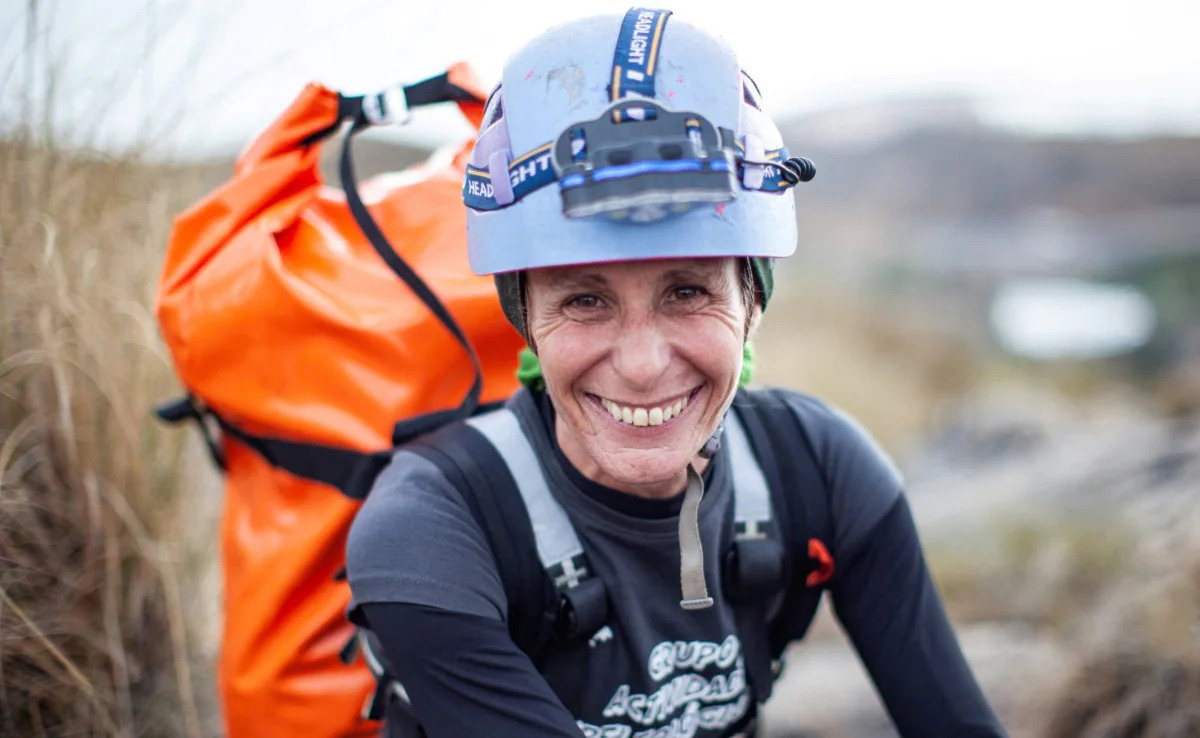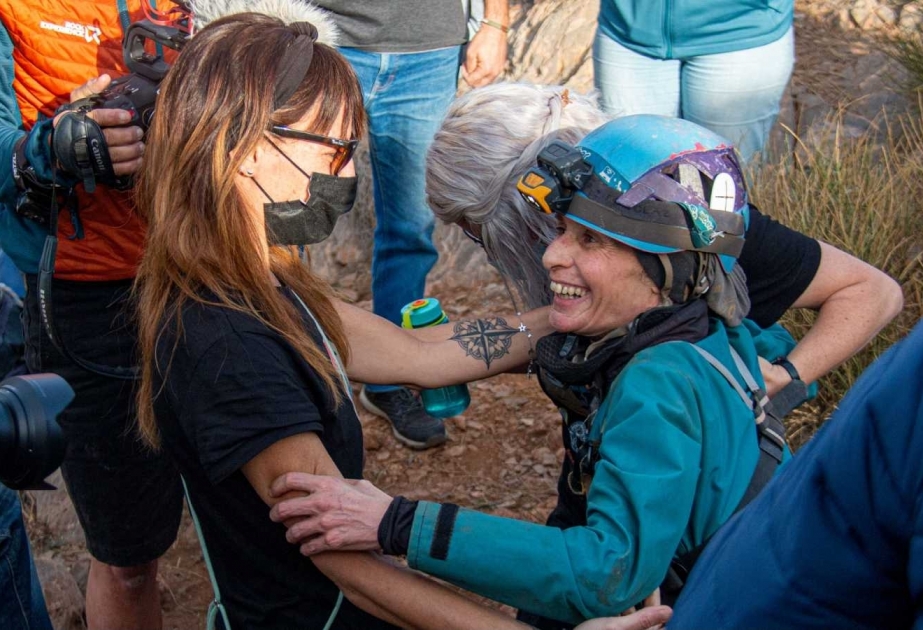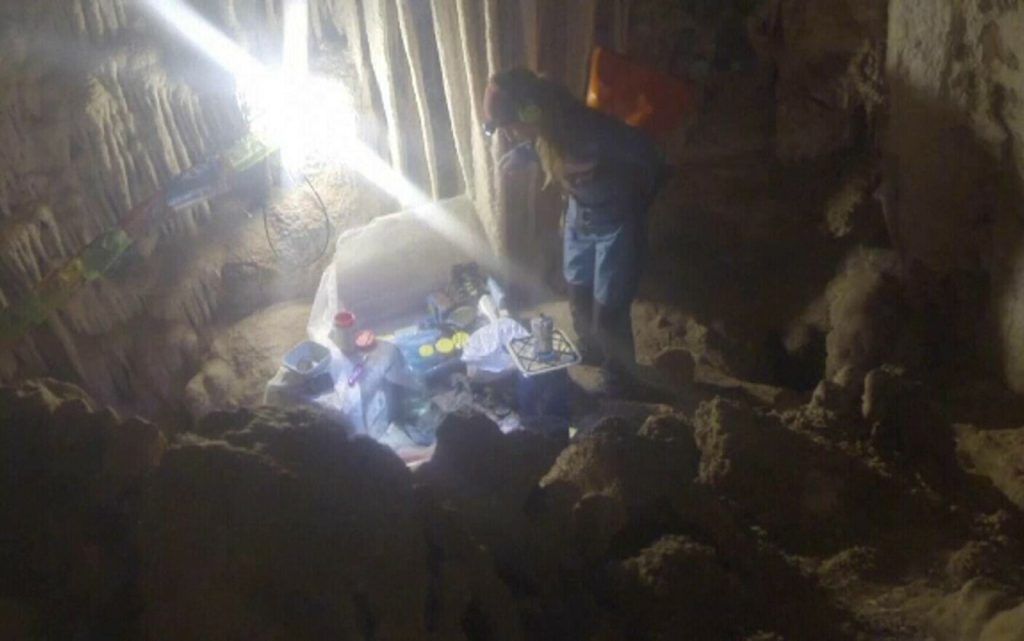Remarkable Woman Survives 500 Days Alone In Dark Underground Cave
What would it be like to spend 500 days alone in a dark cave, disconnected from the outside world? One woman survives 500 days alone in dark underground cave. She is Beatriz Flamini and she can tell you firsthand. The 50-year-old athlete from Madrid emerged from her subterranean home, setting a world record for the longest time a person has spent alone in a cave.
Author:Morgan MaverickReviewer:Professor JhizApr 17, 20231K Shares96.3K Views

What would it be like to spend 500 days alone in a dark cave, disconnected from the outside world? One woman survives 500 days alone in dark underground cave. She is Beatriz Flamini and she can tell you firsthand. The 50-year-old athlete from Madrid emerged from her subterranean home, setting a world record for the longest time a person has spent alone in a cave.
Flamini's extraordinary feat was part of an effort to explore how the human mind and body can cope with extreme solitude and deprivation. And what she discovered may surprise you.
Beatriz Flamini, Woman Survives 500 Days Alone In Dark Underground Cave
Beatriz Flamini, a 50-year-old athlete from Madrid, has emerged victorious from spending 500 days alone in a cave 70 meters below the surface. Her goal was to learn about how the human mind and body can deal with extreme solitude and deprivation, and she managed to achieve what is thought to be a world record for the longest time a person has spent alone in a cave.
Despite facing difficult moments such as a fly invasion and intense cravings, Flamini refused to give in and focused on living in the present, dedicating herself to her commitment of living in a cave for 500 days.
Flamini lost track of time after 65 days and passed the time reading, drawing, knitting, and managing to keep fit. She documented her journey on cameras for an upcoming documentary. When asked about her experience, she said, "I got on very well with myself." She never spoke out loud to herself and stayed focused on her commitment.
Flamini's team delivered food to a collection point, and in return, she left them her excrement to be picked up. With no way to keep track of time, Flamini was confused and half asleep when her team came down to the cave to tell her time was up.
Even when she emerged, Flamini didn't have a rush of joy over seeing the sunlight because it felt like she had "only just gone in."

Spanish mountaineer emerges after 500 days in underground cave
Flamini's journey is a testament to the human spirit and our ability to overcome extreme conditions.
“„For me, as an elite extreme sportswoman, the most important thing is being very clear and consistent about what you think and what you feel and what you say.- Beatriz Flamini
Physical Effects Of Extreme Isolation
One of the most obvious and immediate effects of extreme isolation is physical in nature. Isolation can lead to a range of physical health problems, including a weakened immune system, cardiovascular disease, and an increased risk of stroke.
Additionally, the lack of access to fresh air and natural light can cause a host of problems, including vitamin D deficiency and circadian rhythm disruptions.
The human body is designed to be active, and prolonged periods of inactivity can lead to muscle atrophy, decreased bone density, and other issues. When a person is isolated in a small space, movement is often limited, which can exacerbate these problems.
Furthermore, when a person is isolated for an extended period, their diet may suffer due to a lack of access to fresh fruits and vegetables. Poor nutrition can lead to a range of health problems, including vitamin deficiencies, anemia, and gastrointestinal issues.
Psychological Effects Of Extreme Isolation
While the physical effects of extreme isolation are readily apparent, the psychological effects can be even more severe. Humans are social creatures, and being cut off from others can lead to a range of mental health problems, including anxiety, depression, and PTSD.
Furthermore, prolonged periods of isolation can lead to a decline in cognitive function, including memory loss, decreased attention span, and difficulty with decision-making.
Isolation can also lead to changes in behavior and personality. For example, a person who is isolated for an extended period may become more introverted and less interested in social interaction. Additionally, isolation can lead to a heightened sense of paranoia and mistrust, which can be difficult to shake even after the person has been reintegrated into society.
Coping Mechanisms For Extreme Isolation
Despite the potentially severe physical and psychological effects of extreme isolation, some people are able to cope with it better than others. One key factor in successful isolation is having a strong sense of purpose.
This purpose can come from a variety of sources, including work, religion, or personal interests. Having a clear goal in mind can help a person stay motivated and focused during prolonged periods of isolation.
Another coping mechanism for extreme isolation is maintaining a routine. This routine can include a regular schedule for eating, sleeping, and exercising, as well as time for leisure activities.
Having a routine can help a person maintain a sense of normalcy and structure, which can be especially important when living in an environment where time can seem to stand still.
Finally, communication with the outside world is crucial for coping with extreme isolation. This can include communication with family and friends, as well as regular updates on current events. The ability to communicate with others can help alleviate feelings of loneliness and isolation and can provide a source of comfort and support.
The Role Of Technology In Coping With Extreme Isolation
In recent years, technology has played an increasingly important role in helping people cope with extreme isolation. For example, video conferencing platforms like Zoom have allowed people to stay in touch with family and friends during prolonged periods of isolation.
Social media platforms like Facebook and Twitter have also provided a means of staying connected with the outside world and keeping up to date on current events.
Technology has also been used to simulate social interaction in isolated environments. For example, virtual reality systems can create realistic social environments that can help alleviate feelings of loneliness and isolation. Similarly, robotics systems have been used to create social companions that can provide emotional support to isolated individuals.
People Also Ask
How Can Extreme Isolation Be Harmful To Mental Health?
Extended periods of isolation can lead to a number of negative effects on mental health. Feelings of loneliness, depression, and anxiety can increase, and individuals may also experience difficulty with sleep, concentration, and decision-making. In extreme cases, individuals may develop hallucinations or other psychotic symptoms. Research has shown that social isolation can have a significant impact on brain function, including areas associated with emotion regulation and stress response.
What Are Some Coping Mechanisms For Dealing With Isolation And Deprivation?
Coping mechanisms for dealing with isolation and deprivation will vary depending on the individual and the circumstances. Some common strategies include practicing mindfulness, engaging in physical exercise, maintaining a daily routine, and finding creative outlets for self-expression. Staying connected with loved ones through technology or written communication can also be helpful. It is important to prioritize self-care and seek professional help if needed.
Can Extreme Isolation And Deprivation Lead To Permanent Changes In The Brain And Body?
There is evidence to suggest that extreme isolation and deprivation can lead to permanent changes in both the brain and body. Research has shown that social isolation can have an impact on brain structure and function, including decreased gray matter volume in areas associated with social cognition and increased activity in areas associated with the stress response. Prolonged isolation can also lead to changes in immune function, cardiovascular health, and metabolism.
Are There Any Potential Benefits To Spending Extended Periods Of Time In Isolation?
While prolonged isolation can have negative effects, there may also be potential benefits to spending time alone. Some individuals may find that isolation provides a sense of calm and allows for increased self-reflection and personal growth. Isolation can also provide a unique opportunity to focus on personal goals and interests without the distractions of everyday life.
How Does Extreme Isolation Affect Social Skills And Interpersonal Relationships?
Extended periods of isolation can have a negative impact on social skills and interpersonal relationships. Individuals may become more withdrawn and less able to effectively communicate and connect with others. Prolonged isolation can also make it difficult to read social cues and interpret emotions, leading to further difficulty with social interactions. It is important to actively work to maintain social connections and practice social skills, even when in isolation.
Conclusion
The newswhere a woman survives 500 days alone in dark underground cave has captured the attention of people around the world. Beatriz Flamini's experience of surviving 500 days alone in a dark underground cave sheds light on the effects of extreme isolation and deprivation on the human mind and body.
Despite the numerous challenges she faced, Flamini managed to cope by staying focused on the present and engaging in various activities such as reading, drawing, and exercising.
Her story raises important questions about the potential long-term effects of extreme isolation on mental health, social skills, and the brain and body. Overall, Flamini's incredible feat of surviving for 500 days alone in a cave serves as a testament to the resilience of the human spirit.

Morgan Maverick
Author
Morgan Maverick is an unorthodox news reporter driven by an insatiable hunger for the truth. Fearless and unconventional, he uncovers hidden narratives that lie beneath the surface, transforming each news piece into a masterpiece of gritty authenticity. With a dedication that goes beyond the boundaries of conventional journalism, Morgan fearlessly explores the fringes of society, giving voice to the marginalized and shedding light on the darkest corners.
His raw and unfiltered reporting style challenges established norms, capturing the essence of humanity in its rawest form. Morgan Maverick stands as a beacon of truth, fearlessly pushing boundaries and inspiring others to question, dig deeper, and recognize the transformative power of journalism.

Professor Jhiz
Reviewer
Professor Jhiz brings fun to teaching anatomy. Born in China, she shares her fascination for how the body works.
Students say her lectures are lively with jokes and stories. She draws cartoon diagrams that highlight structures creatively.
Professor seeks to inspire curiosity and joy in anatomy. She treats each class like a show using props and costumes.
When not teaching, Jhiz enjoys karaoke and novelty socks. Her goal is passing on a spirit of wonder to students.
Latest Articles
Popular Articles

